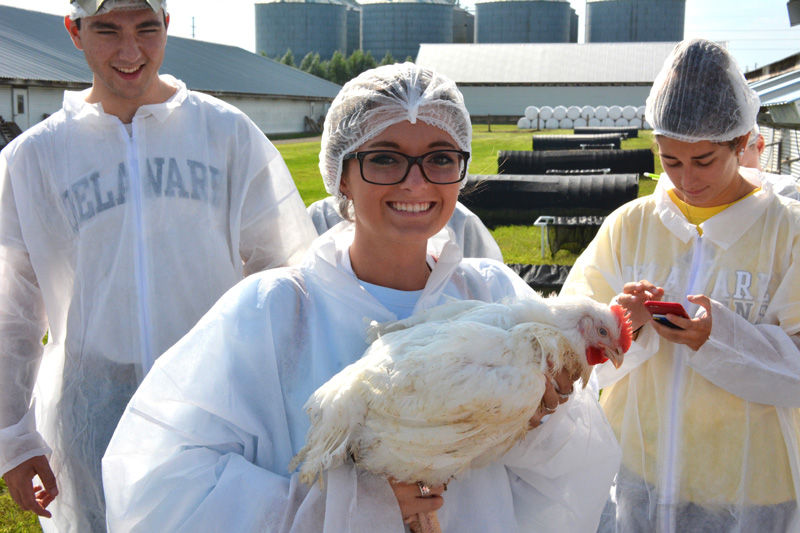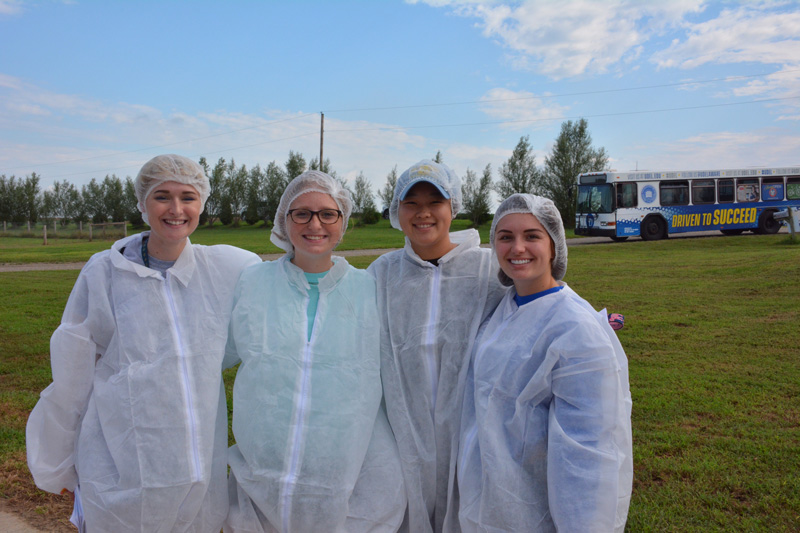


Students tour Delaware poultry farm
Photo by Michele D. Walfred October 24, 2018
Agriculture course exposes students to industry, career possibilities
Agriculture is an $8 billion industry in Delaware and nearly 70 percent of that economy is related to poultry production, either directly or indirectly through corn, soybean and grain production.
Some University of Delaware students have never been to a farm, but the students in Professor Mark Isaacs’ “Understanding Today’s Agriculture,” class are no longer among them. Isaacs and other UD College of Agriculture and Natural Resources staff led a group of 21 students on a September trip to a family-run organic poultry farm in Kent County. The visit was the first of four Saturday field trips scheduled for the Fall 2018 semester.
Isaacs, director of the Carvel Research and Education Center in Georgetown, teaches from both Newark and Georgetown. He alternately connects from each campus through Polycom ITV-equipped classrooms, a high-definition, distance technology that connects via IP addresses and uses multiple screens with the capacity to share and record video and other media.
The field trips expose students to diverse career possibilities and provide an opportunity to network with agriculture professionals. Georgie Cartanza, Cooperative Extension poultry agent, led the first tour and provided an overview of the poultry industry in the region and the unique challenges and rewards for poultry growers.
The family-owned farm maintains four poultry houses, 65 feet wide and 600 feet long, retrofitted to be Global Animal Partnership (GAP) certified as an organic farm. Each house can be home to 37,000 broiler chickens.
The perimeter of the farm has two rows of trees to act as vegetative environmental buffers (VEBs), serving as dust and odor filters while beautifying the property.
Cartanza explained that steroids and hormone use in all commercial poultry production is illegal. In this organic farm, all birds are raised without antibiotics. Anything around or provided to the poultry must be certified organic.
As a biosecurity measure, all visitors to poultry farms must wear protective gear such as overalls, hairnets and shoe coverings. This measure is designed to prevent humans from tracking in contaminants which could harm the chickens. Delaware’s adherence to strict biosecurity measures has paid off with no serious disease incidences since 2004.
Technological advances in poultry house construction and innovations in energy control and monitoring allow farms like this one to be maintained full-time with only two people. Energy costs are a persistent challenge for growers. With the decision to convert to growing only organic chickens, this farm accepted the higher costs of retrofitting the houses to meet strict organic standards, as well as incurring the higher cost and carbon footprint to obtain organic feed. Since the U.S. does not produce enough organic grain to meet demand, organic poultry ingredients are imported from Argentina and Turkey. Consumer demand for organically-raised poultry is increasing and provides this farm family with a higher return for its investment.

Contact Us
Have a UDaily story idea?
Contact us at ocm@udel.edu
Members of the press
Contact us at 302-831-NEWS or visit the Media Relations website

